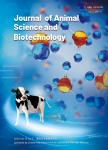Dietary methionine deficiency stunts growth and increases fat deposition via suppression of fatty acids transportation and hepatic catabolism in Pekin ducks
Dietary methionine deficiency stunts growth and increases fat deposition via suppression of fatty acids transportation and hepatic catabolism in Pekin ducks作者机构:State Key Laboratory of Animal NutritionKey Laboratory of Animal(Poultry)Genetics Breeding and ReproductionMinistry of Agriculture and Rural AffairsInstitute of Animal SciencesChinese Academy of Agricultural SciencesBeijing 100193China Key Laboratory of Feed Biotechnology of Ministry of Agriculture and Rural AffairsInstitute of Feed ResearchChinese Academy of Agricultural SciencesBeijing 100081China
出 版 物:《Journal of Animal Science and Biotechnology》 (畜牧与生物技术杂志(英文版))
年 卷 期:2022年第13卷第6期
页 面:1871-1886页
核心收录:
学科分类:090502[农学-动物营养与饲料科学] 0905[农学-畜牧学] 09[农学]
基 金:supported by China Agriculture Research System of MOF and MARA(CARS-42) the Science and Technology Innovation Project of Chinese Academy of Agricultural Sciences(CXGC-IAS-09) Central Scientific Institution Fundamental Research Funds(1610382022005).
主 题:Fat deposition Hepatic catabolism Methionine deficiency Pekin duck Proteomics
摘 要:Background:Although methionine(Met),the first-limiting dietary amino acid,has crucial roles in growth and regulation of lipid metabolism in ducks,mechanisms underlying are not well understood.Therefore,the objective was to use dietary Met deficiency to investigate the involvement of Met in lipid metabolism and fat accumulation of Pekin ducks.Methods:A total of 150 male Pekin ducks(15-d-old,558.5±4.4 g)were allocated into 5 groups(6 replicates with 5 birds each)and fed corn and soybean meal-based diets containing 0.28%,0.35%,0.43%,0.50%,and 0.58%Met,respectively,for 4 weeks.Met-deficient(Met-D,0.28%Met)and Met-adequate(Met-A,0.43%Met)groups were selected for subsequent molecular studies.Serum,liver,and abdominal fat samples were collected to assess the genes and proteins involved in lipid metabolism of Pekin ducks and hepatocytes were cultured in vivo for verification.Results:Dietary Met deficiency caused growth depression and excess fat deposition that were ameliorated by feeding diets with adequate Met.Serum triglyceride and non-esterified fatty acid concentrations increased(P0.05),whereas serum concentrations of total cholesterol,low density lipoprotein cholesterol,total protein,and albumin decreased(P0.05)in Met-D ducks compared to those in Met-A ducks.Based on hepatic proteomics analyses,dietary Met deficiency suppressed expression of key proteins related to fatty acid transport,fatty acid oxidation,tricarboxylic acid cycle,glycolysis/gluconeogenesis,ketogenesis,and electron transport chain;selected key proteins had similar expression patterns verified by qRT-PCR and Western blotting,which indicated these processes were likely impaired.In vitro verification with hepatocyte models confirmed albumin expression was diminished by Met deficiency.Additionally,in abdominal fat,dietary Met deficiency increased adipocyte diameter and area(P0.05),and down-regulated(P0.05)of lipolytic genes and proteins,suggesting Met deficiency may suppress lipolysis in adipocyte.Conclusion:Taken together,these data demonstrated that dietary Met deficiency in Pekin ducks resulted in stunted growth and excess fat deposition,which may be related to suppression of fatty acids transportation and hepatic catabolism.



